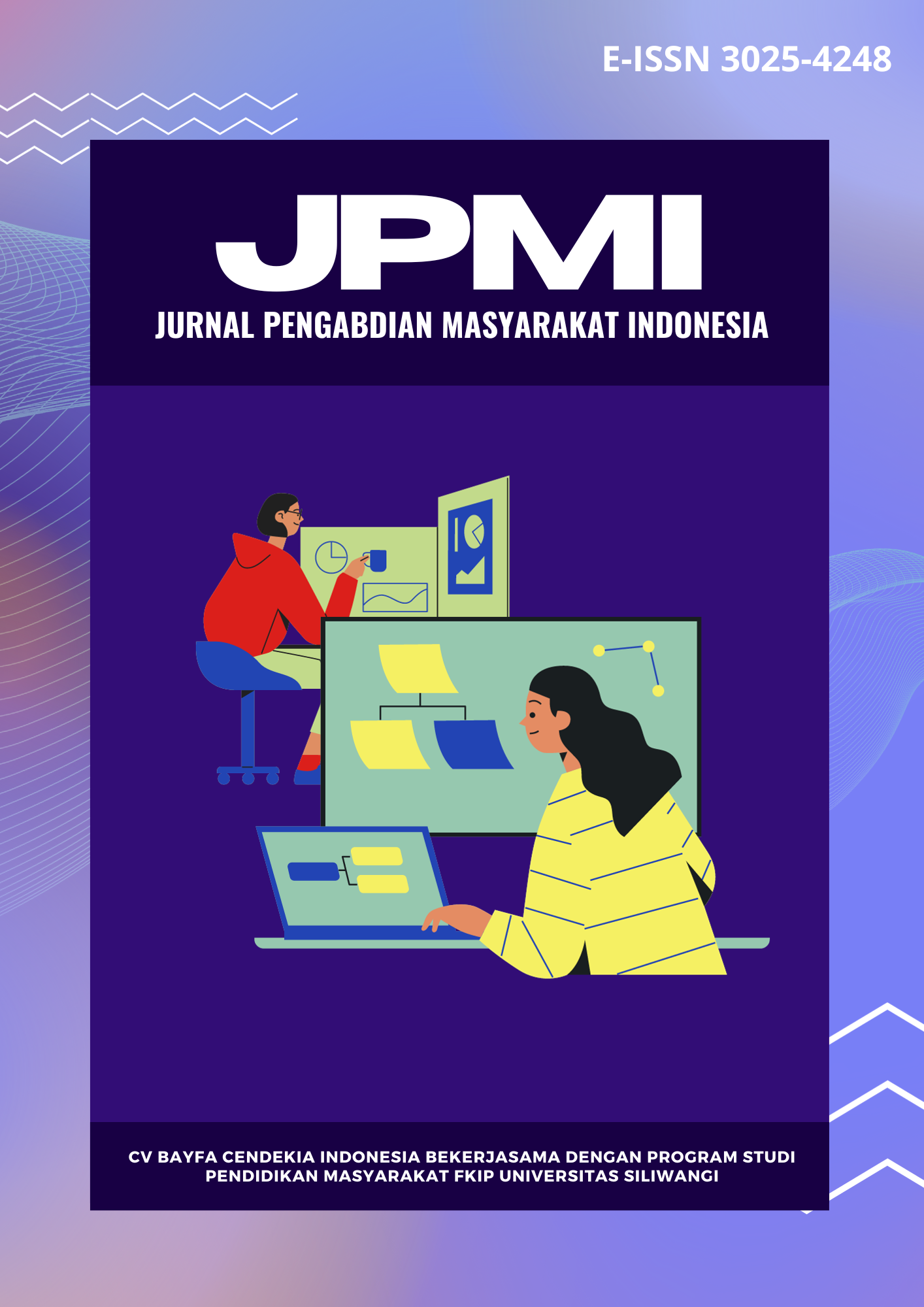PENDAMPINGAN BAGI GURU DI SEKOLAH INDONESIA BANGKOK (SIB) DALAM MENINGKATKAN PEMBELAJARAN LITERASI
DOI:
https://doi.org/10.1234/jpmi.v2i3.177Kata Kunci:
Mentoring, Teachers, Literacy, The Indonesian School of BangkokAbstrak
Literacy is the activity of reading, understanding, and applying information that is an essential foundation for children in their golden age. The Indonesian School of Bangkok faces challenges in literacy in early grades that affect students' abilities related to reading, writing, and understanding texts. Teachers/educators must use a comprehensive and progressive approach in teaching literacy to foster children's reading interests and critical thinking skills. The mentoring program carried out aims to train early-grade teachers in literacy instruction. The mentoring methods included identifying needs, focus group discussions (FGDs) using a share and care approach, practice, and evaluation. The results showed significance, with an average score above 80 for aspects such as participant numbers, the conditioning of the support process, the competence of the resource persons, and the presentation of materials. Participants demonstrated improved understanding and readiness to apply new techniques. Positive feedback suggests that support was highly relevant and applicable, enhancing literacy teaching abilities at the Indonesian School of Bangkok. Recommendations include integrating more technology and interactive methods to enrich student's learning experiences and encouraging teacher collaboration to strengthen the implementation of techniques learned in the classroom.
Referensi
Altun Dilek. (2019). Investigating Pre-Service Early Childhood Education Teachers’ Technological Pedagogical Content Knowledge (TPACK) Competencies Regarding Digital Literacy Skills and Their Technology Attitudes and Usage. Journal of Education and Learning, 8(1), 249–263. https://doi.org/10.5539/jel.v8n1p249
Aminah, S. (2021). Best Practise Pemanfaatan Lingkungan Sekolah Literat dan Media Pembelajaran Literasi Untuk Menumbuhkan Minat Baca Siswa Kelas Awal. TEACHER: Jurnal Inovasi Karya Ilmiah Guru, 1(1), Article 1. https://doi.org/10.51878/teacher.v1i1.517
Antasari, I. W. (2017). Implementasi Gerakan Literasi Sekolah Tahap Pembiasaan di MI Muhammadiyah Gandatapa Sumbang Banyumas. LIBRIA, 9(1), Article 1. https://doi.org/10.22373/1680
Azam Syukur Rahmatullah, E. Mulyasa, Syahrani, Fien Pongpalilu, & Riana Eka Putri. (2022). Digital era 4.0: The contribution to education and student psychology. Linguistics and Culture Review, 6(3), 89–107. https://doi.org/10.21744/lingcure.v6nS3.2064
Baginda Sitompul. (2020). Kompetensi Guru dalam Pembelajaran Di Era Digital. Jurnal Pendidikan Tambusai, 6(3), 13953–13960.
Basyiroh, I. (2017). Program Pengembangan Kemampuan Literasi Anak Usia Dini. Tunas Siliwangi: Jurnal Program Studi Pendidikan Guru PAUD STKIP Siliwangi Bandung, 3(2), 120–134. https://doi.org/10.22460/ts.v3i2p120-134.646
Cropley, A. (2015). Creativity in education and learning: A guide for teachers and educators. Routledge.
Danhua Peng & Zhonggen Yu. (2022). A Literature Review of Digital Literacy over Two Decades. Education Research International.
Dea Digna, Minsih, & Choiriyah Widyasari. (2023). Teachers’ Perceptions of Differentiated Learning in Merdeka Curriculum in Elementary Schools. International Journal of Elementary Education, 7(2). https://doi.org/10.23887/ijee.v7i2.54770
Dwi Lutfi Nur Anisa. (2022). Implementation of Independent Learning Curriculum as a 21st Century Learning Model in Higher Education. Manageria: Jurnal Manajemen Pendidikan Islam, 7(2), 233–248. https://doi.org/10.14421/manageria.2022.72-15
ET Widhyahening. (2016). Literary Works and Character Education. International Journal of Languange and Literature, 4(1), 176–180. https://doi.org/10.15640/ijll.v4n1a20
Fiona Suwana & Lily. (2017). Empowering Indonesian women through building digital media literacy. Kasetsart Journal Of Social Sciences, 38(3), 212–217. https://doi.org/10.1016/j.kjss.2016.10.004
Gebhardt, Markus, Schwab, Susanne, Krammer, Mathias, & Andreas. (2015). General and special education teachers’ perceptions of teamwork in inclusive classrooms at elementary and secondary schools. Journal for Educational Research Online 7, 2, 129–146. https://doi.org/10.25656/01:11493
Kopnina, H. (2020). Education for the future? Critical evaluation of education for sustainable development goals. The Journal of Environmental Education, 51(4), 280–291. https://doi.org/10.1080/00958964.2019.1710444
Machado, J. M. (2013). Early childhood experiences in language arts: Early literacy. Cengage learning.
Nazar, R., Chaudhry, I. S., Ali, S., & Faheem, M. (2018). Role Of Quality Education for Sustainable Development Goals (SDGs). PEOPLE: International Journal of Social Sciences, 4(2), 486–501. https://doi.org/10.20319/pijss.2018.42.486501
Nur Cahyati Ngaisah, Munawarah, & Reza Aulia. (2023). Perkembangan Pembelajaran Berdiferensiasi dalam Kurikulum Merdeka pada Pendidikan Anak Usia Dini. Jurnal Pendidikan Bunayya, 9(1). http://dx.doi.org/10.22373/bunayya.v9i1.16890
Nurani, S. S., Riyanti, N., Herdianti, N. A., Saputri, C., Akmalia, A. S., Laksono, P. J., Hamdan, A., & Laksono, B. A. (2024). Penerapan Teknologi Literasi dalam Membentuk Kreativitas Anak Pondok Tahfidz Nuruul Millah. Jurnal Pengabdian Masyarakat Indonesia, 2(2), Article 2. https://doi.org/10.1234/jpmi.v2i2.170
Priasti, S. N., & Suyatno, S. (2021). Penerapan Pendidikan Karakter Gemar Membaca Melalui Program Literasi di Sekolah Dasar. Jurnal Kependidikan: Jurnal Hasil Penelitian dan Kajian Kepustakaan di Bidang Pendidikan, Pengajaran Dan Pembelajaran, 7(2), 395–407. https://doi.org/10.33394/jk.v7i2.3211
Safitri, S., & Ramadan, Z. H. (2022). Implementasi Literasi Budaya dan Kewargaan di Sekolah Dasar. Mimbar Ilmu, 27(1), 109–116. https://doi.org/10.23887/mi.v27i1.45034
Saputra, H., Auwal, T. M. R. A., & Mustika, D. (2017). Pembelajaran Inkuiri Berbasis Virtual Laboratory Untuk Meningkatkan Kemampuan Literasi Sains Mahasiswa Calon Guru Pendidikan Fisika Universitas Samudra. Jurnal IPA & Pembelajaran IPA, 1(2), Article 2. https://doi.org/10.24815/jipi.v1i2.9688
Sasmita, W., Nursalim, N., Widodo, A., Anyastuti, E., Suratman, S., Pristiani, Y. D., & Wiranata, I. H. (2023). Pengembangan Potensi Guru MGMP PPKn SMP Kota Kediri dalam Pembuatan Modul Ajar. Jurnal Pengabdian Masyarakat Indonesia, 1(4), Article 4. https://doi.org/10.1234/jpmi.v1i4.55
Unduhan
Diterbitkan
Cara Mengutip
Terbitan
Bagian
Lisensi
Hak Cipta (c) 2024 Monica Widyaswari, Delia Indrawati, Ari Khusumadewi, Agustin Hanivia Cindy, Atan Pramana

Artikel ini berlisensi Creative Commons Attribution 4.0 International License.



